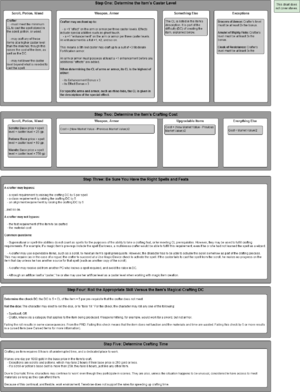Magic Item Crafting
Step One: Note the item's Caster Level
Scrolls, potions, or wands: the crafter must meet the minimum CL to cast the spell stored in the scroll, potion, or wand. The crafter may craft any of these items at a higher caster level than the minimal, though this raises the cost of the item, as well as the DC. The crafter may not lower the caster level beyond what is needed to cast the spell.
Arms or armor: the caster may enchant up to:
- a +1 "effect" on the arm or armor per three caster levels. Effects include special abilities such as ghost touch.
- a +1 "enhancement" on the arm or armor per three caster levels. An enhancement is a flat +1, +2, and so on.
This means a 9th levl caster may craft up to a suit of +3 Moderate Fortification armor.
An arm or armor must possess at least a +1 enhancement before any additional "effects" are added.
When determining the CL of arms or armor, its CL is the highest of either:
- its Enhancement Bonus x 3
- its Effect Bonus x 3
For specific arms and armor, such as rhino hide, the CL is given in the description of the special effect.
Cloaks of resistance: the caster may only enchant up to +1 per three caster levels. So to make a cloak of resistance +3, the caster level must be 9.
All other items: the CL is part of the difficulty of creating the item, explained below.
Step Two: Determine Crafting Costs
Scrolls: Base price = spell level × caster level × 25 gp
Potions: Base price = spell level × caster level × 50 gp
Wands: Base price = spell level × caster level × 750 gp
Arms, Armor: Cost = (New Market Value - Previous Market Value)/2
Upgradable Items: Cost = (New Market Value - Previous Market Value)/2
Other Items: Cost = Market Value/2
Step Three: Be sure you have the right feats and spells
A caster may bypass:
- a spell requirement by raising the crafting DC by 5 per spell
- a class requirement by raising the crafting DC by 5
- an alignment requirement by raising the crafting DC by 5
...and so on.
A caster may not bypass:
- the feat requirement of the item to be crafted
- the material cost
Common questions:
- Supernatural or spell-like abilities do not count as spells for the purposes of the ability to take a crafting feat, or for meeting CL prerequisites. However, they may be used to fulfill crafting requirements. For example, if a magic item's pre-reqs include the spell Darkness, a mul'niessa crafter would be able to fulfill this requirement, even if he or she had not learned the spell as a wizard.
- A crafter may use expendable items, such as a scroll, to meet an item's spell prerequisite. However, the character has to be able to activate the scroll somehow as part of the crafting process. This may require (as in the case of a rogue) the crafter to succeed at a Use Magic Device check to activate the spell. If the caster fails to cast the spell from the scroll, he makes no progress on the item that day unless he has another source for that spell (such as another copy of the scroll).
- A crafter may receive aid from another PC who knows a spell required, and avoid the raise in DC.
- Although an artificer isn't a "caster," he or she may use her artificer level as a caster level when working with magic item creation.
Step Four: Roll the appropriate skill versus the item's magical crafting DC
Determine the check DC: the DC is 5 + CL of the item + 5 per pre-requisite that the crafter does not meet.
Roll the dice: The character may elect to roll the dice, or to "take 10." For the check, the character may roll any one of the following:
- Spellcraft, OR
- Craft/x, where x is a category that applies to the item being produced. Weaponsmithing, for example, would work for a sword, but not armor.
Failing the roll results in some consequences. From the PRD: Failing this check means that the item does not function and the materials and time are wasted. Failing this check by 5 or more results in a cursed item (see Cursed Items for more information).
==Step Five: Determine Crafting Timetem requires 8 hours of uninterrupted time, and a dedicated place to work.
- It takes one day per 1000 gold in the base price in the item to craft.
- Exceptions are scrolls and potions, which may take 2 hours if their base price is 250 gold or less.
- If a scroll or potion's base cost is more than 250, they take 8 hours, just like any other item.
- Due to Dramatic Time, characters may continue to 'work' even though they participate in scenes. They are also, unless the situation happens to be unusual, considered to have access to most materials so long as they can afford them.
- Because of this continual, and flexible, work environment, Tenebrae does not support the rules for speeding up crafting time.
